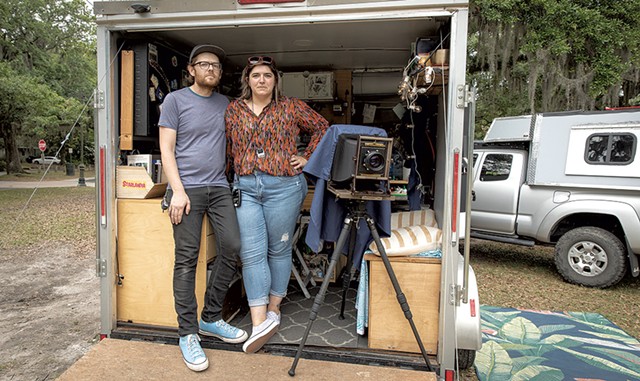
- Courtesy of Nathaniel Thompson
- Adam Scher and Monica Jane Frisell in the Nomadic Photo Ark
Monica Jane Frisell and Adam Scher can't quite pin down why, two years ago, they left Seattle to live as nomads and photograph people across America. "Just [to] try and figure out what it's all about, I guess," Frisell said. "Sounds kind of cheesy."
Towing a trailer called the Nomadic Photo Ark that doubles as a kitchen pantry and darkroom, the married couple create portraits and accompanying audio recordings of locals in cities and towns all over the U.S. The result is an ongoing multimedia collage of American life. In fall 2021, Frisell and Scher brought the project to North Hero, and this August they returned to Vermont, parking for several weeks at the White Market in Lyndonville.
They have a few concrete goals: to meet new people, make art and document stories, which will be presented in a pop-up exhibit on Lyndon's Sanborn Covered Bridge on Thursday, August 31.
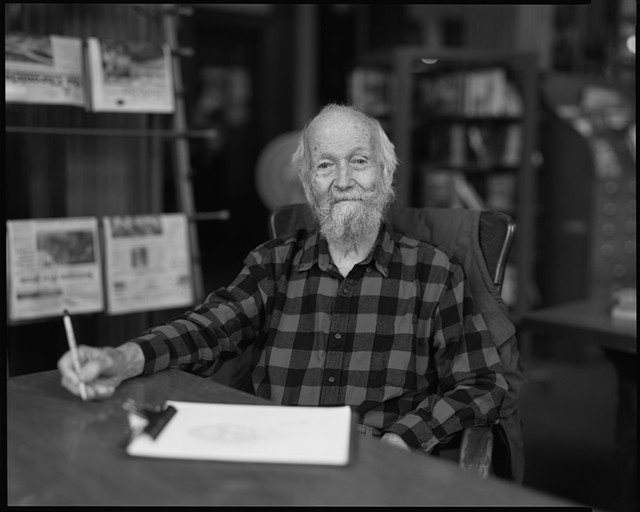
- Courtesy of Monica Jane Frisell
- Dorian of Lyndon
When pressed, the pair offers a deeper motive for their project. Divisiveness baffles Frisell, who is tired of "grandiose noise and exceptionalism" making the front page. Nomadic Photo Ark's "Portrait of US" aims to show what unites Americans at a time when it's rare for people to slow down and listen, the couple said.
"I read the news, and it just doesn't fit what I've experienced," Frisell said. "Even when I talk to somebody who I know does not think how I think, I still don't leave wanting to scream at them."
Frisell shoots with a 1940s large-format film camera and develops the negatives as 8-by-10-inch black-and-white photos. Sometimes she shoots near where the trailer is parked, but she prefers to follow subjects to a place that's meaningful to them, such as a park, garden or home.
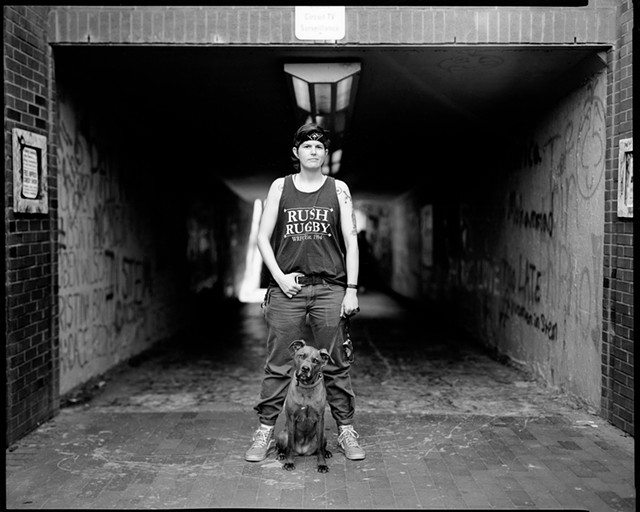
- Courtesy of Monica Jane Frisell
- Katy of Raleigh, N.C.
The full-body portraits capture locals' distinctive outfits and postures. Subjects maintain a straight face and gaze directly into the camera, almost as if to say, "I see you" to the viewer. In Cleveland, a woman wearing a T-shirt that reads "Love yourself" poses beside a motorcycle. In Birch Bay, Wash., a woman matches her background, sporting thick black sunglasses and an American flag T-shirt while posed in front of the real thing.
Scher runs the tape recorder and edits the audio down to a few minutes. The couple open every interview with the same prompt: "Tell us about a pivotal moment in your life." The question often leads their subjects to speak about struggling with loss, sobriety, race, or sexual or cultural identity, Scher said.
The stories often unfold as a crescendo. Sharina in Cleveland talked about switching jobs before speaking about her son's murder. Tobi in Green Mountain Falls, Colo., segued from a conversation about finishing graduate school to one about dating after her late husband's death. Kim in Cleveland spoke about combating the prejudice with which she was raised.
"It was very brave and candid of her to be able to talk about that stuff," Frisell said of Kim's interview. "It was really inspiring to me to see an older woman who has actually gone through the work to try and change."
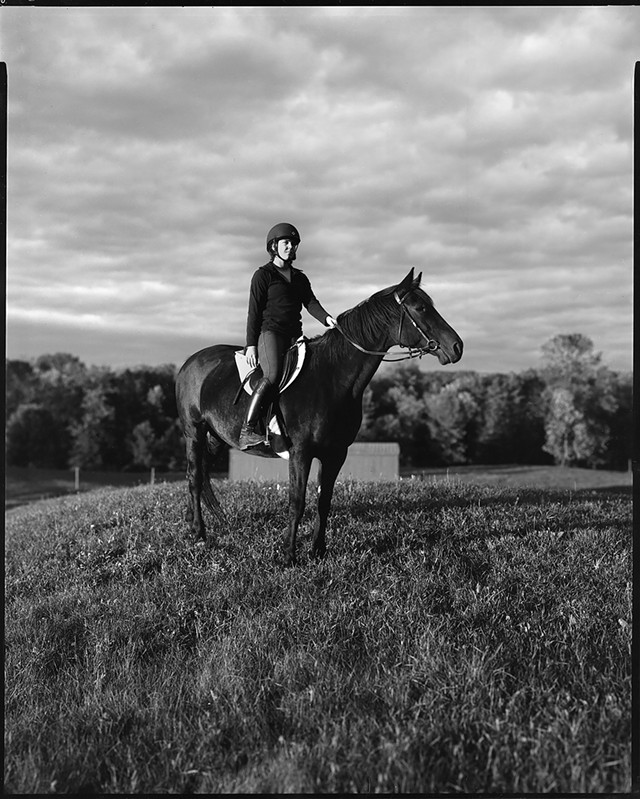
- Courtesy of Monica Jane Frisell
- Saxon of North Hero
Martha Elmes, founder and director of the Satellite gallery and community space in Lyndonville, invited the Nomadic Photo Ark to town. She heard about the traveling artists through her son, a friend of Frisell's. Local organizations usually sponsor the project, so Elmes secured funding from the Town of Lyndon and two nonprofits, the Vermont Community Foundation and Burklyn Arts Council. She's also hosting Frisell and Scher at her home.
The deaths of two local historians in recent years have highlighted the importance of having someone record the people of Lyndon, Elmes said.
"I wanted to document some of these people who are older, or people who you see walking by all the time and you wonder, What's their story?" Elmes said. "Well, now you'll know."
Originally planning to hit the road by herself, Frisell started constructing the mobile darkroom in December 2020 with the help of a mechanic friend. They built the back half of the 84-square-foot trailer as a darkroom and the front half as a kitchen — now complete with a sink, spice rack, ice maker and propane pizza oven.
Then Frisell and Scher matched on Tinder. Nomadic living appealed to Scher, who had completed long-distance bike rides from Seattle to San Diego and across Europe and the American South.
So, after just a few months of knowing Frisell, Scher quit his job at a pizza shop to take charge of the project's audio component.
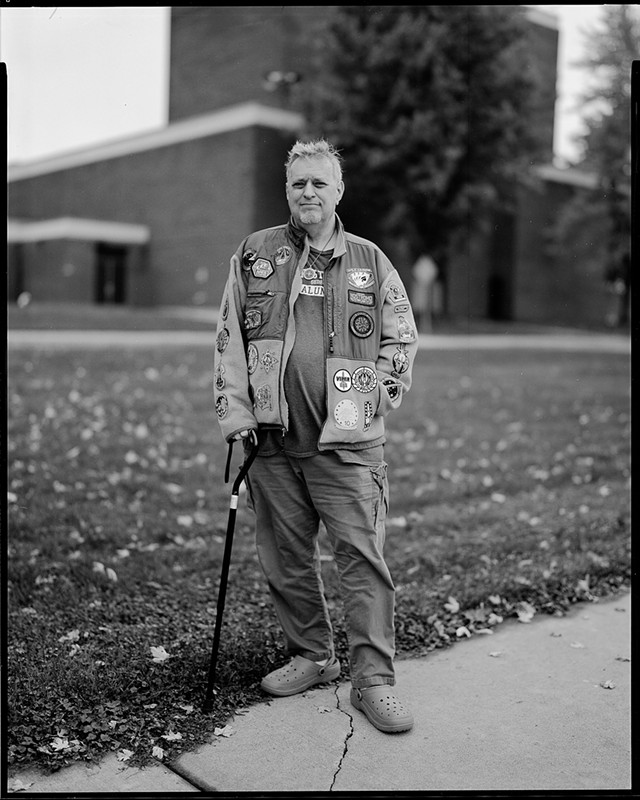
- Courtesy of Monica Jane Frisell
- Mark of Rochester, N.Y.
"That kind of desire to meet people and talk to people throughout the country was there," Scher said. "So it fit very well, and we meshed very, very quickly."
Frisell and Scher also share a philosophy when it comes to attracting people who want their stories told. They rely on word of mouth and a "Share your story" banner hung on the trailer, hoping to draw subjects who won't shy away from meaningful conversation or acknowledgment of their hardships.
Frisell said she thinks deeply about the ethics of interviewing. "I'm always hyper-concerned that we're not doing something right," she said. "We've talked to people who have had bad experiences with journalists and then are really hesitant to speak with us because they were taken advantage of by that person. And that really breaks my heart."
That concern was on display when Frisell and Scher arrived at a local woman's house. Beverly greeted them wearing a hot pink shirt and sporting long blond hair that reached her waist. She had reached out to Frisell and Scher by email after seeing an ad for the project. Giving a tour of her backyard, Beverly beamed at her view overlooking the roaring South Wheelock Branch of the Passumpsic River.
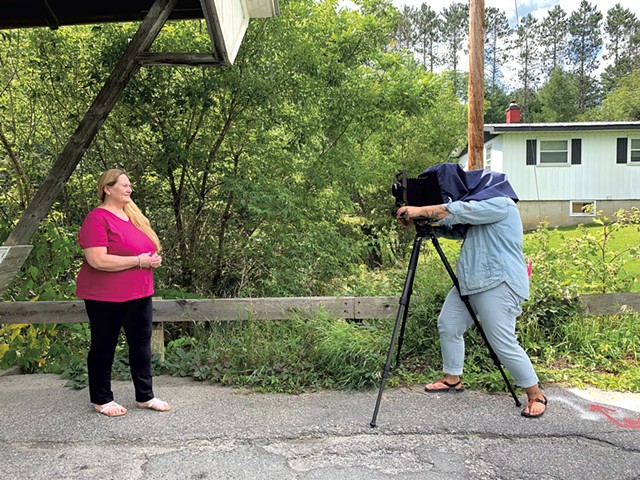
- Hannah Feuer
- Monica Jane Frisell taking Beverly's portrait in front of the Chamberlin Mill Covered Bridge in Lyndon
The mood shifted as Frisell and Scher started the interview in the front yard. Beverly cried as she shared that her son died in March of a fentanyl overdose at age 29. Her son was someone "who would help anyone do anything," she said. He kept Narcan, an overdose-reversing drug, taped to the roof of his truck and inside his apartment door, his mother added.
"It's been months, but it feels like it was just yesterday, over and over every day," Beverly said, her voice quavering between sobs. "And knowing what he died from, it just pains me that there are so many other families going through this."
"I'm so sorry," Frisell said. And then, referring to the opioid epidemic, "It seems to be hitting this place just relentlessly, right?"
"Everywhere," Beverly said. "And there's not enough being done."
After the interview, the trio moved to take Beverly's portrait in front of the Chamberlin Mill Covered Bridge next door to her house. As Frisell positioned the camera, Beverly said she wasn't sure she deserved the spotlight, given that many of her neighbors have lived in Lyndon much longer than she has.
"Everyone deserves this," Frisell replied.
Scher said people seem to find it easy to open up to the couple, a vulnerability he partly attributed to the open-ended prompt that allows them to share as much as they'd like.
"Still, I was not expecting her to say that," Frisell said. "Some of the hardest ones have been like, we're just laughing and sitting and then they whack us in the face with a story like that. It's heartbreaking."
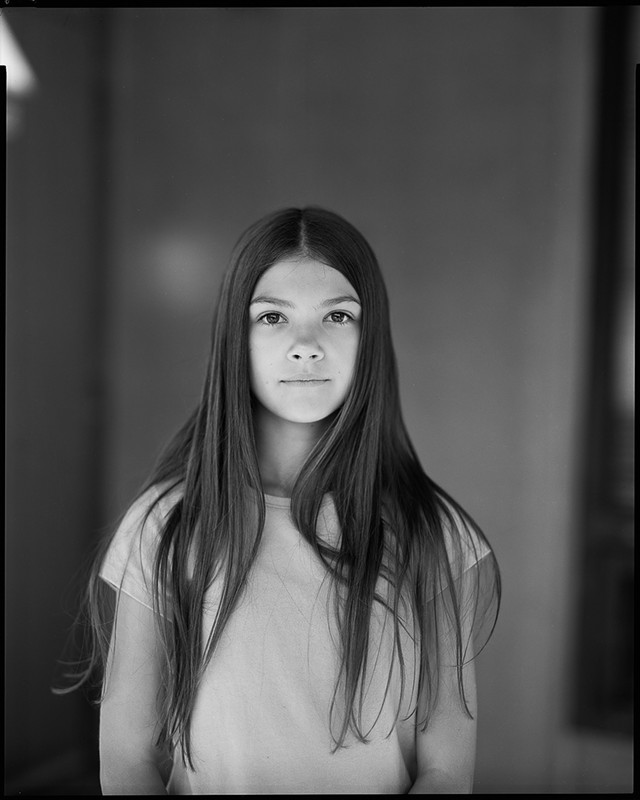
- Courtesy of Monica Jane Frisell
- Izzy of Green Mountain Falls, Colo.
The couple are protective of their subjects. They understand that many people are "hurting to open up," as Scher put it, while others aren't comfortable publicly sharing their trauma. Referencing their nonconfrontational interview style, they said they don't consider their work to be journalistic.
"I think it's different if, like, we were working with the Times and doing a story on fentanyl and went up to her," Frisell said of Beverly. "That's a completely different approach of getting a story from the person, instead of just letting them lead."
The couple's method has motivated nearly 300 people to participate in the project over Frisell and Scher's two years on the road. They're not done yet — they'll head to Orlando, Fla., next, then to Massillon, Ohio, in 2024. The portraits and audio clips are available on nomadicphotoark.com.
Has the nomadic life helped Frisell figure out "what it's all about"?
"The more I meet people," Frisell said, "[the more] I'm constantly learning I really don't know anything at all. I feel even more confused."









Comments
Comments are closed.
From 2014-2020, Seven Days allowed readers to comment on all stories posted on our website. While we've appreciated the suggestions and insights, right now Seven Days is prioritizing our core mission — producing high-quality, responsible local journalism — over moderating online debates between readers.
To criticize, correct or praise our reporting, please send us a letter to the editor or send us a tip. We’ll check it out and report the results.
Online comments may return when we have better tech tools for managing them. Thanks for reading.